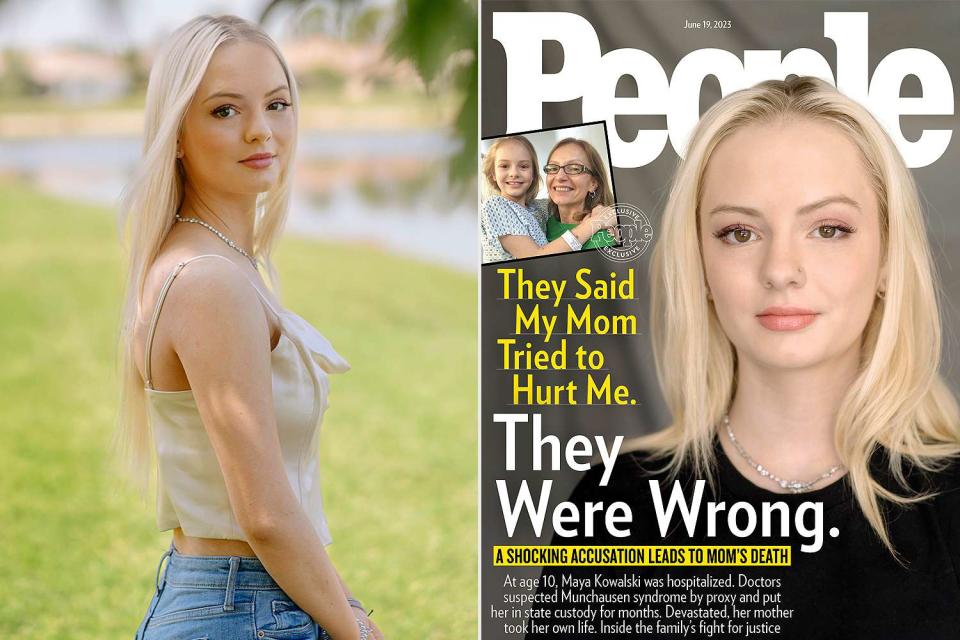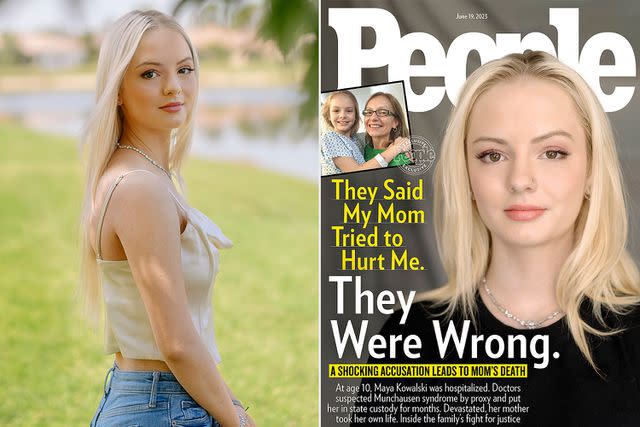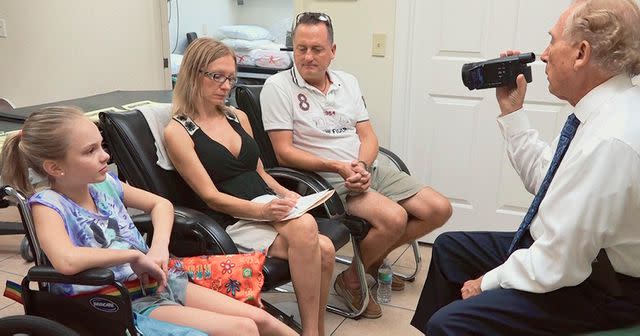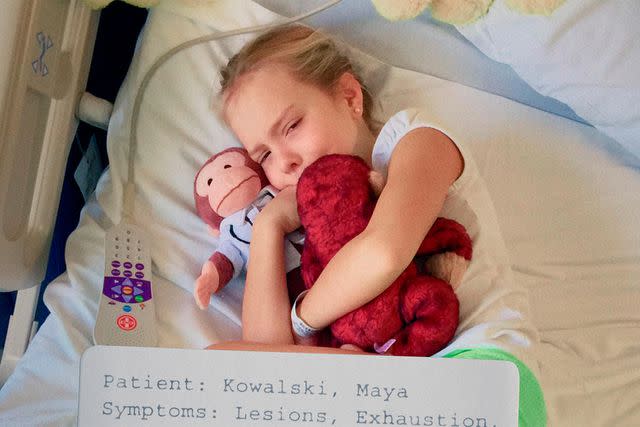A Shocking Accusation of Munchausen by Proxy Leads to a Mom’s Death by Suicide: 'I Want Justice' (Exclusive)
Ahead of the premiere of a new Netflix documentary, Take Care of Maya, Maya Kowalski tells PEOPLE how a hospitalization for her painful and rare neurological condition led to her mother’s suicide

Gesi Schilling
Maya Kowalski photographed at home in Venice, Fla., in May for PeopleMaya Kowalski is opening up about her painful medical condition and how accusations of Munchausen syndrome by proxy led to her mother Beata Kowalski’s suicide.
In this week's issue of PEOPLE, the 17-year-old and her father Jack Kowalski detail the severe pain caused by her rare neurological disorder and how one hospital visit ended in tragedy.
In 2015, Maya was 9 years old when she began experiencing asthma attacks and headaches. Lesions had formed on her legs and arms, and her feet began cramping and curling. Many doctors were puzzled by her symptoms and with at least one suggesting it was all in her head.
“But Maya would be crying 24/7,” Jack, 61, says. “We knew she wasn’t faking.”
Her mother Beata was then told about complex regional pain syndrome (CRPS), a rare neurological condition that can cause constant or intermittent pain in the extremities, a burning sensation and extreme sensitivity to touch, according to the Cleveland Clinic. The condition can make even routine procedures, like taking a blood pressure reading, excruciating.
The family then turned to Dr. Anthony Kirkpatrick, an anesthesiologist and pharmacologist in Tampa who specializes in CRPS and he officially diagnosed Maya with the condition. CRPS “is an abnormal function of the sympathetic nervous system,” he says. Over time, “your senses get ramped up so if a drop of water touches your skin, it can feel like somebody’s jabbing you with a knife.”

Gesi Schilling
Kirkpatrick started treating Maya with infusions of the anesthetic drug ketamine, but Maya's symptoms were persistent, so he suggested a more drastic treatment: a five-day "ketamine coma" in which the nervous system, flooded with a high dose of the drug, is essentially "reset." The procedure is still experimental and not approved by the FDA, so the family needed to travel to Mexico to have it done. Although risky, Jack says “it was the only hope we had,” and the treatment, which Maya underwent in November 2015, ultimately helped her debilitating symptoms.
“I felt amazing,” Maya recalls. Afterward, she continued to receive ketamine infusions to control her flare-ups due to CRPS, a disorder that can be managed but not cured, Dr. Kirkpatrick says.

Netflix
Maya and her parents Beata and Jack with Dr. Anthony Kirkpatrick in 2015.But, in October 2016 Maya was rushed to the emergency room at Johns Hopkins All Children’s Hospital in St. Petersburg, Florida with crippling stomach pain. Her parents explained to the medical team that Maya had CRPS. Beata — who was trained as a registered nurse — pleaded with doctors to administer a high dose of ketamine, the one treatment they believed was effective for their daughter’s pain.
That request raised concerns among hospital staff, who alerted child protective services. An investigative team later accused Beata of child abuse due to Munchausen syndrome by proxy (MSP), a mental disorder in which a caretaker of a child either makes up fake symptoms or causes real symptoms to make it appear that the child is injured or ill, according to Healthline.
A court-ordered psychological evaluation eventually determined Beata did not have the mental illness, but less than a week after Maya checked into Johns Hopkins, she was placed in state custody and remained in the hospital away from her family for more than three months.
“One day I was in the ICU, and my mom kissed me on the forehead and was like, ‘I love you. I’ll see you tomorrow.’ I never saw her again,” Maya recalls. “I was medically kidnapped. I tried being hopeful, but there was a point where I thought, ‘I’m never getting out of this place.’”
Without any contact with her daughter, Beata “was deteriorating,” Jack says. “She would stay up and research and hardly eat.” And when a judge in a hearing denied Beata the chance to give her daughter a hug, it “destroyed her,” Jack says. Beata was inconsolable afterward.
After more than 87 days without her daughter, Beata died by suicide in January of 2017, at the age of 43. “I’m sorry,” she wrote in an email discovered after her death, “but I no longer can take the pain being away from Maya and being treated like a criminal. I cannot watch my daughter suffer in pain and keep getting worse.”
“This little girl was already hurting, and now I had to tell her that her mother’s passed,” Jack says. “It was horrible.”

Beata Kowalski
Maya Kowalski suffering from CRPS symptoms in 2015.If you or someone you know is considering suicide, please contact the 988 Suicide and Crisis Lifeline by dialing 988 or visiting 988lifeline.org.
Five days later Maya was released into her dad’s custody and returned home to Venice, Florida. While there, she struggled with both the pain of her condition and the grief from her mother’s death. Jack says her health had also regressed while in the hospital due not receiving ketamine treatments. A court order prevented her from continuing ketamine after her release.
Instead, the family had to turn to other therapies, and as a result her recovery, they say, was slower and more painful than it needed to be. “We worked with her slowly: water therapy, things like that,” Jack tells PEOPLE. “But it was horrible — after losing my wife, I thought my daughter was next.” It was a year and a half until she was able to walk unassisted again.
Today, Maya has full use of her arms and legs, but some nights the pain still causes her to cry out. “I do my best to push through,” she says. “I’ve already missed a lot, so I want to make the most of life now.”

Gesi Schilling
Jack Kowalski with son Kyle and Maya, photographed at home in Florida for People in May.The family has since filed a lawsuit against the hospital, which is scheduled for trial in September — more than six years after Beata’s death. “For us as a family to move on, we need to fulfill my mom’s wish and fight,” Maya says. “I want justice for my mom.”
A spokesperson from Johns Hopkins All Children's Hospital would not comment directly on Maya's case but shared a statement to PEOPLE that says in part: "Our first responsibility is always to the child brought to us for care, and we are legally obligated to notify the Department of Children and Families (DCF) when we detect signs of possible abuse or neglect. It is DCF that investigates the situation and makes the ultimate decision about what course of action is in the best interest of the child."
Now, the Kowalskis will tell their story in a new Netflix documentary, Take Care of Maya, premiering at the Tribeca Festival and available to stream everywhere June 19.
For the full story on Maya Kowalski, pick up the latest issue of PEOPLE, on newsstands Friday, or subscribe here.
For more People news, make sure to sign up for our newsletter!
Read the original article on People.


